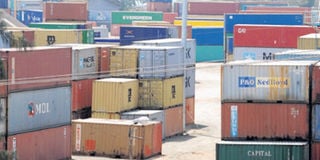Cement, tobacco first to be cleared under EAC tax deal

Containers of cargo at Mombasa port. Effective April 1, cigarettes, cement and neutral spirit destined for Uganda, Kenya, and Rwanda will be cleared under the single customs territory system. FILE PHOTO
What you need to know:
Intention. Move intended to see faster movement and clearance of goods between member states.
Kampala.
Cement and cigarettes will be the first goods to be cleared under a new trade deal allowing for joint collection of customs taxes by Uganda, Kenya and Rwanda.
Under the deal, expected to take effect on April 1, clearing agents have been granted access rights to relocate and carry out their duties in any of the partner states under the single customs territory (SCT) system, raising hope for improved flow of goods and curbing dumping.
In an interview yesterday with the Uganda Revenue Authority Commissioner for Customs, Mr Richard Kamajugo, the extension of single custom territory (SCT) to other products followed successful clearance of fuel imports into Uganda from Kenya (Mombasa port).
He said: “The items being brought onboard are neutral spirit, cigarettes and cement traded between Kenya and Uganda.”
He continued: “Cement and products manufactured by Mukwano Group traded between Uganda and Rwanda will also be cleared through the SCT.”
This according to Mr Kamajugo will see faster movement and clearance of goods.
Kenya Revenue Authority (KRA) commissioner of customs service Beatrice Memo on Wednesday said the first phase will also cover neutral spirit.
“Effective April 1, importers and exporters of cigarettes, cement and neutral spirit originating from Uganda, Kenya and Rwanda for trade within the three countries shall have them cleared through the SCT system,” said Ms Memo.
clearance of cargo and petroleum products
“All dry cargo arriving at the port of Mombasa and petroleum products at Kenya Pipeline Company (KPC) station in Kisumu destined to the Republic of Rwanda shall be cleared under the SCT and not transit regime,” KRA said. Petroleum products to Rwanda cleared at other KPC depots within the country will, however, continue to be declared under the transit regime until further notice, the tax agency added.
The EAC revenue authorities have agreed on granting access rights to clearing agents in Uganda, Kenya and Rwanda who have been trained on how to use the ASYCUDA and Simba computer systems to enable them clear and forward goods in any of the partner states. Full implementation of the SCT is expected by June 30 when Tanzania and Burundi will later join in.
Analysts said putting the revenue officials in one location will reduce the disputes that have arisen out of products bilateral deals that member states sign with non-EAC states.
About the SCT
Under the Single Customs Territory (SCT), EAC member states will adopt a destination model of clearance of goods where assessment and collection of revenue is to be done at the first point of entry. It allows free circulation of goods in the single market with variations to accommodate goods exported from one partner state to another. Customs administrations at destination states retain control over assessment of taxes. EAC officials say this will crystallise the gains of integration characterised by minimal internal border controls and a more efficient institutional mechanism in clearing goods.




